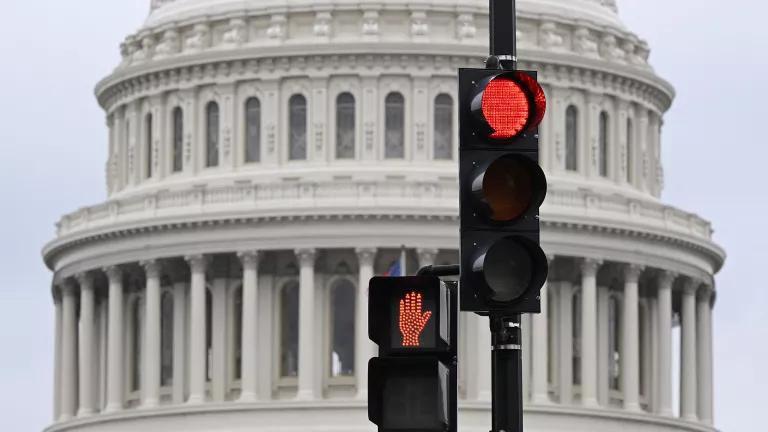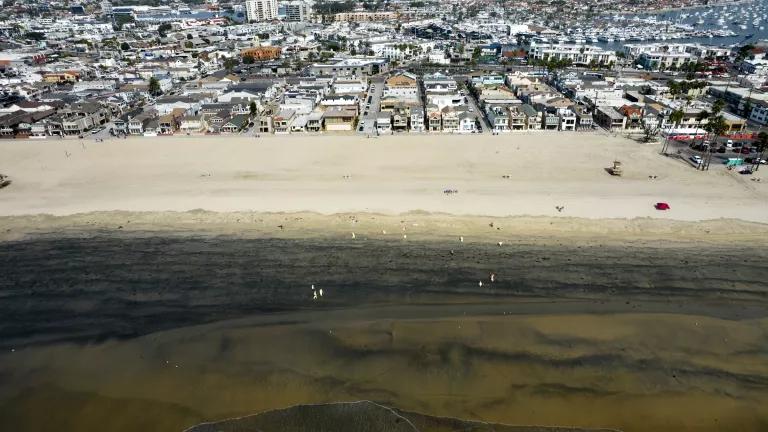Taking Stock of Fossil Fuel Reform Under Biden
The Department of the Interior has the opportunity to reform a broken industry and protect our lands and waters for future generations.

Louisiana Coast
NASA via Flickr
The Biden Administration came into office with ambitious climate policies and has already faced multiple legal challenges—including several lawsuits and a recent ruling from a Louisiana court blocking the nationwide pause on new oil and gas leasing. But the Administration still has options in the fight against climate change.
We Need Strong Action Now
Now, more than ever, we need bold and decisive action on climate. The West is once again parched and burning, suffering through historic wildfires, record-setting droughts and severe heat waves. Hurricane season is well-underway on the East Coast, with thousands recently without power and flooded from Tropical Storm Henri, and scientists predicting a more intense hurricane season still ahead.
The Intergovernmental Panel on Climate Change, in its latest report, cautioned that our actions—especially the extraction and burning of fossil fuels—are responsible for the current climate crisis, and that we must act now to prevent further catastrophic changes.
The fossil fuel industry produces the lion’s share of greenhouse gas emissions, and the Biden Administration’s executive order on Tackling the Climate Crisis at Home and Abroad was a key step towards reforming fossil fuel development by imposing a pause on oil and gas leasing on public lands and in federal waters. It also directed the Department of the Interior to review its permitting and leasing responsibilities, and to consider its “broad stewardship responsibilities over the public lands and in offshore waters, including potential climate and other impacts associated with oil and gas activities.” As of today, Interior has yet to release the results of its review.
NRDC Opposes Industry’s Deregulatory Agenda
Oil and gas-producing states sued to block implementation of the executive order, including a suit in federal district court in the Western District of Louisiana. The states also sought a preliminary injunction—to lift the pause and let leasing go forward during the pendency of the lawsuit.
NRDC and other groups sought to intervene in that lawsuit. We were denied, but filed an amicus curiae brief arguing against the injunction, highlighting the Department of Interior’s obligation to protect the environment, its discretion to design a leasing program fulfilling that objective, and contradicting the states’ arguments that a leasing pause would wreak immediate economic harms.
The judge granted the states’ motion for preliminary injunction, in a ruling that found the executive order’s pause on leasing illegal and required that, absent an alternative legal basis, Interior move forward with holding individual lease sales. In a recent legal filing, Interior reported that it was complying with the injunction, by moving forward with a final notice of sale for one offshore lease sale, proceeding with the environmental review process for another offshore lease sale, and conducting a scoping process for potential onshore lease sales.
DOI Still Has Authority to Reform the Fossil Fuel Leasing Process
As we wait for the Department of the Interior to release its review of its onshore and offshore leasing programs, and to take further action on individual lease sales, we want to highlight the agency’s obligations to protect the environment and public health, and the urgent need to act decisively in addressing the climate crisis.
Even with the recent court ruling, the Department of the Interior has ample authority to curb oil and gas development and mitigate the worst effects of the fossil fuel industry.
- First, the statutes guiding the Department of the Interior’s leasing of mineral rights—among them, the Outer Continental Shelf Lands Act and the Mineral Leasing Act—require Interior to consider the effect of leasing on the environment and on communities, and protect public lands and waters. See e.g., 43 U.S.C. §§ 1701(a)(5); 1344(a)(1).
- Second, contrary to what the states have argued in the recent litigation, the Department of the Interior is not required to prioritize extraction on our lands and in our waters, and has the discretion to balance energy needs and environmental considerations. Id.
- Third, Interior has considerable discretion to shape offshore and onshore leasing programs to protect the environment and mitigate the climate crisis. The recent court ruling disallowed the leasing pause directed by the executive order, but did not—and in fact, cannot—alter Interior’s fundamental obligation to protect the environment or discretion to shape onshore and offshore leasing programs. Interior has the discretion to curtail onshore and offshore leasing programs based on environmental, climate, and public health considerations. See e.g., 43 U.S.C. § 1344(a); Center for Sustainable Economy v. Jewell, 779 F.3d 588, 610 (D.C. Cir. 2015). Interior also has the discretion to choose not to hold individual lease sales and has repeatedly exercised this discretion in the past. See 43 U.S.C. § 1337(a); California v. Watt (California II), 712 F. 2d 584, 588 (D.C. Cir. 1983). Further, Interior must follow laws like the National Environmental Policy Act in administering the leasing programs, which require full consideration of the environmental effects of major government projects, and also require consideration of new significant information.
Importantly, the nation needs to approach the climate crisis as exactly what it is—an unprecedented global emergency, and we need to both interpret and make law and policy in just that context, instead of applying old standards in a vacuum without regard to the magnitude of harm unfolding around us. The Department of Interior could rely on its governing statutes to pursue a no new leasing policy, based on the significant harms the fossil fuel industry inflicts on the environment. It can also use the same grounds to cancel individual lease sales, or significantly restrict the leasing program. And as my colleagues have written, Interior could also make it more difficult for industry to leave behind orphaned wells that continue to pollute the surrounding environment, impose additional pollution controls at well sites, and improve the economic structure of royalty rates so that the public is fairly compensated for extractive activity.
The Department of the Interior has the opportunity to reform a broken industry and protect our lands and waters for future generations. We will continue to push the Administration to move boldly forward in the coming months for the good of all of us.
This blog provides general information, not legal advice. If you need legal help, please consult a lawyer in your state.





